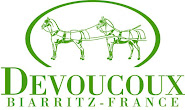Q. What do you love so much about eventing?
A. Jo Whitehouse
Well I come from England! When I was growing up in Pony Club we did cross-country, hunter trials, and fox hunting. Galloping cross-country was the only thing that anyone ever wanted to do. I fox hunted in England and we did lots of twenty meter circles but it was that cross-country! I had a childhood to die for. Then I was able to enjoy my daughter’s childhood. People say did you make her do this because you loved it? You don’t understand, nobody could make my daughter do anything. My late husband was a glider pilot and he was keen for her to do that. She went up with him several times but the horses always pulled. She’s not riding now, she’s finished grad school and earning a living now but I’m sure the horses will drag her back.
Q. What happened to the long format?
A. Jo Whitehouse
Below: Sydney Olympic mascots

It was a combination of things. It started after Sydney. We’d been going through this prior with some changes in the ‘90’s. You couldn’t give two medals for one performance. We had to have two types of competition. Barcelona was the last competition that had the rider that won the individual and one for the team that won the gold. At Atlanta we had the first individual and team. Prior you rode as team and an individual and could win gold for yourself and the team with one performance. The sport was competing against lots of sports for place in Olympics. The US has fielded a team for the Olympics every time since 1912. Suddenly there were these rumblings about if it was a sport so they came up with the two types of competitions. One was individual and one was team; they were there in Atlanta and

there in Sydney. That’s why David was so lucky to have two amazing horses in Custom Made and Giltedge (see right: David on Giltedge ponying Custom Made; photo copyright by Nancy Jaffer). Two wonderful horses got an opportunity they wouldn’t have had before. We went to Sydney and there were rumblings about too expensive and too much land and we’ve got to change it. Jimmy [Wofford] and Denny [Emerson] will tell you it was a European push to have the Euro Warmblood breeds be dominant. But mostly I think it was the sheer cost of putting on the full three-day event. A mixture of that and a sport that was more suitable for specialized breeds. No longer could you get the thoroughbred off the track. Those amazing feats of bringing horse from way down in dressage and getting a medal couldn’t happen anymore. You needed the horse that could break into a 30 in dressage and jump clean in the showjumping. It started to be a different breed of horse that was excelling.
Jack LeGoff had developed a format for World Cup. The IOC [International Olympic Committee] and FEI started making manouvers to make sure the sport stayed in the Olympic Games and that’s when they took the CIC type of competition and developed that into something that could be an Olympic sport. And the speed with which it fell was, whoa! We found out that suddenly Athens was running into trouble with space. They had committed to doing a long format, as had Beijing, they were running into problems and if they turned it into short format they could save huge amounts of money. Athens applied to go short, then the next thing we knew Badminton and Burghley were short format. Before we knew it US was only place you could have long format.
Q. What's the benefit to the long format?
A. Jo Whitehouse
It’s two fold: they’re educational and teach the riders horsemanship. For those who want to learn that they are just amazing. The lower level people want that opportunity to develop those skills that the upper level riders have. The wonderful thing that has always been the case with eventing is that it’s given a lot of horses off the track a second career. The event rider tends to have the skills to work with a pretty highly strung horse. The long format allows them a place to shine. They don’t have to be the best mover that will get the 18 in dressage or jump a highly technical or high jumping course so this is the competition for them. That is an important thing: that the horses will have a place to participate as long as that is out here. And it makes it more affordable! It creates a playing field and a job for the off the track horse that’s more affordable and allows more people to enjoy the sport without pricing them out of the market.
Q. The long format no longer takes place at our upper level competitions. Should it?
A. Kevin Baumgardner
Back in 2004, I believe, I was the chair of a task force to deal with the issues that were FEI-driven pushing to get rid of the long format. We pushed back pretty hard back then. The place where we got traction was at the Training level and at the one-star level where the format has stayed in the US only. The FEI, in its wisdom, decided to eliminate from its rule book phases A, B, and C for the one-star which leaves us with no FEI long format events. It’s quite confusing.

There’s some question as to whether or not you can run those phases anyway. There are a significant number of members who want to continue the long format experience. It’s also some of the people who are officials and course designers who are concerned about losing the education in riding forward. We support eventing at all levels but what we want to get is an option for those who want to do the long format and get the education that comes along with it. It’s a great education in horsemanship. You learn so much in getting your horse ready and competing on the day. It’s a pinnacle destination. I’d put it more in that framework than should we have it at Intermediate or Advanced. Jim Wofford would like to see a parallel sport developed. We have a Preliminary long format USEA/ USEF and Training three day competitions which are doing well. Definitely what we’re trying to do at the USEA is help the organizers put on the event and promote the sports. T3D and P3D.
If you could reverse the clock, had I been in the position I’m in now, I’d be kicking and screaming.

Above: Kevin showing his stuff
photo courtesy of Kevin Baumgardner
I go to Rolex and it’s a 4 Star, short format, and it’s pretty exciting to watch. I’m not saying that there aren’t great short format events and that they can’t exist side by side. But I have my preferences and others do too. We are kind of a disputatious group. It’s a bunch of type A’s who like to jump over fixed obstacles. It’s good for the sport and sometimes it’s hard on us but we agree to disagree and more forward.
Robert Kellerhouse is a perfect example: the Fall Galway Downs has a **CCI and a *CCI short and Prelim * classic format 3-day and also has a Training 3-day classic format. This is the same guy who is thinking out of the box with the Prelim challenge. What he would tell you is there’s a lot of room to offer different hings to different people in our sport. That’s what we’re trying to do.
Q. How can the rest of us be involved in bringing the long format back?
A. Jo Whitehouse
Well, a number of things. Obviously participate. If you’ve got young horses put one on your agenda. Volunteer. The organizers, Penny and Brian Ross (amazing people), Becky Broussard and her daughter Sara, Robert Kellerhouse, they believe if they have customers that want them they will offer them as long as they can afford them. So they need entires, volunteers, and sponsors. Get involved ith your local long-format organizer. Call around to your local tack shop to give a prize to the long format competition. If you want this it will take an association and family of members to make it happen. If the members want them: enter them, support them. For us we’re promoting them, we can given them as much attention as the Gold Cup. We’ve got video, website, and photo coverage. We would also like to hear from members who would like to cover them for us. It would save us money if they can write them up and take pictures and help build their portfolios.
A. Kevin Baumgardner
One of the things I think people need to do be aware of is we need to make sure land is kept open for eventing and horses. Get involved in land conservation. This sport is dependant on large open areas. The young people need to be aware of that! The future is positive for this sport; it is a great sport with great horses and great people. I'm honored to be apart of it.









No comments:
Post a Comment